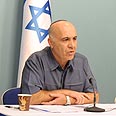

According to Cohen, "Neither Israel nor Hamas surrendered. The risk we are taking is on a level and a security challenge we will be able to deal with. There are 20,000 Izz al-Din al-Qassam fighters in Gaza, and another 200 terrorists won't make the world crash down upon us."
Latest stories on Shalit deal:
- 'We hope it's last holiday without Gilad' Cabinet approves Shalit deal Hamas: Shalit deal a national Palestinian achievement
- Gilad Shalit timeline: 1,934 days in Hamas captivity
- Op-ed: Anatomy of a deal
The Shin Bet chief admitted, "We can't guarantee that the released prisoners won't issue terror attacks, but this is the best deal we could ever get."
Although Shalit will be released as early as next week, the practical outline for the deal "has yet to be finalized, and the other side is suspicious too. The process must be approved by the legal echelon, after which we will start identifying and gathering the prisoners."
He estimated that Hamas would grow stronger following the deal, and that the more moderate Fatah would become weaker, but said he believed Hamas would not initiate an escalation.

Gilad Shalit's parents, Wednesday morning (Photo: Noam Moskovich)
Talking to reporters, Cohen said Shalit would be physically released from Hamas captivity next week as Israel releases 450 prisoners, 279 of them sentenced to life terms.
The differences between the sides were always big, although "90% of the deal was finalized as early as three years ago and we didn't start from scratch in July."
The Shin Bet chief explained that the list of names had been finalized a while ago, and that the negotiations focused on the prisoners' destination – who would be deported and who wouldn't.
"In the initial talks in July we realized that they were willing to compromise, after they understood that Israel would refuse to release symbols and senior commanders like Marwan and Abdullah Barghouti and Ahmed Saadat.
"They also gave up on their initial and maximum demand to release 1,400 prisoners. On the other hand, we compromised too and in the past two weeks we agreed to things we didn't agree to in the past: The release of Israeli Arabs, the release of a bigger number of Gazan murderers and a larger amount of east Jerusalem terrorists," Cohen added.
Compliments to Egypt
In the recent weeks, Hamas agreed that Israel would be the one to select 25 "heavy" prisoners from the list.
"On Sunday after Yom Kippur we did our homework and chose the 25 'VIP prisoners' and the six Israelis who would be released, as well as the 110 terrorists who would be transferred to the West Bank.
"We had two and a half very tense days when we were in one building and Hamas representatives were in another, in the midst of intensive talks."
He complimented Egypt for "acting seriously, responsibly and with a lot of determination in order to advance the negotiations. The Egyptians and their intelligence heads deserve every credit. They didn't make things easy for us, it was in a bid to reach an agreement."
The mediation was fully Egyptian, the Shin Bet director stressed. The German mediator was out of the picture in July, "as Hamas claimed he was acting unfairly and leaning towards Israel.
"In spite of all their problems, in spite of the reality in Sinai and although Egypt had internal problems in the past two weeks in light of the violent Coptic protests, they didn't send us away and did what they did despite potential internal criticism."
Cohen said he spoke to the Egyptian mediators in their own language and that there was never any direct contact between the Israelis and Hamas.
So why did it take so long? According to Cohen, mainly because of the meticulous examination of each and every name of terrorist about to be released.
The Shin Bet chief elaborated on the security arrangements and limitations of the terrorists returning to the West Bank, as determined in the deal:
- They will be supervised or subject to military arrangements.
- They won't be able to cross the Green Line or leave abroad for 10 years.
- They will be restricted to the area of their homes.
- Once a month they will be forced to report to the IDF Coordination and Liaison Authority.
The Palestinian Authority and its organizations had no part in the deal, in its implementation or enforcement. Cohen admitted that "there are things we won't be able to supervise, like Palestinians sent abroad who try to return to Gaza through the tunnels."
- Follow Ynetnews on Facebook
- Receive Ynetnews updates
directly to your desktop















